Throughout his life Funakoshi, through training in karate, developed a philosophy he believed every Karateka (Karate student) should follow to develop ones character to it's fullest. This philosophy he molded into twenty precepts of which ever student should strive to follow. Through these rules one can see how dedicated Funakoshi was to the study of karate and his belief that one could obtain more than the skill of self-defense through hard, diligent training. Funakoshi believed that the philosophy of karate could be carried over into daily life where it was an essential element in developing ones character to it's fullest. This philosophy he transformed in the following rules;
-
Karate begins and ends with "rei" courtesy
-
There does not exist an offensive attitude in karate.
-
Karate is an aid to justice.
-
Know yourself first, then you can know others.
-
Spiritual development is paramount; technical skills are merely a means to an end.
-
It is necessary to let kokoro (the mind) free.
-
Misfortune is a result of neglect.
-
Karate training is not only in the dojo.
-
Karate is lifelong training.
-
Confront your problems with karate spirit.
-
Karate is like hot water. If you do not heat it constantly it grows tepid.
-
Do not think you have to win. Think you do not have to lose.
-
Mold yourself according to your opponent.
-
The secret in combat resides in directing it.
-
Think of your arms and legs as you would sharp swords.
-
When you leave home, think that you have numerous opponents waiting for you. (It is your behavior which will invite or discourage trouble from them).
-
Ready position for beginners and natural position for advanced students.
-
Strive for the perfect kata, real combat is something else.
-
Do not forget
a) strength and weakness of power,
b) slowness and speed of technique,
c) expansion and contraction of the body -
Devise at all times.




















